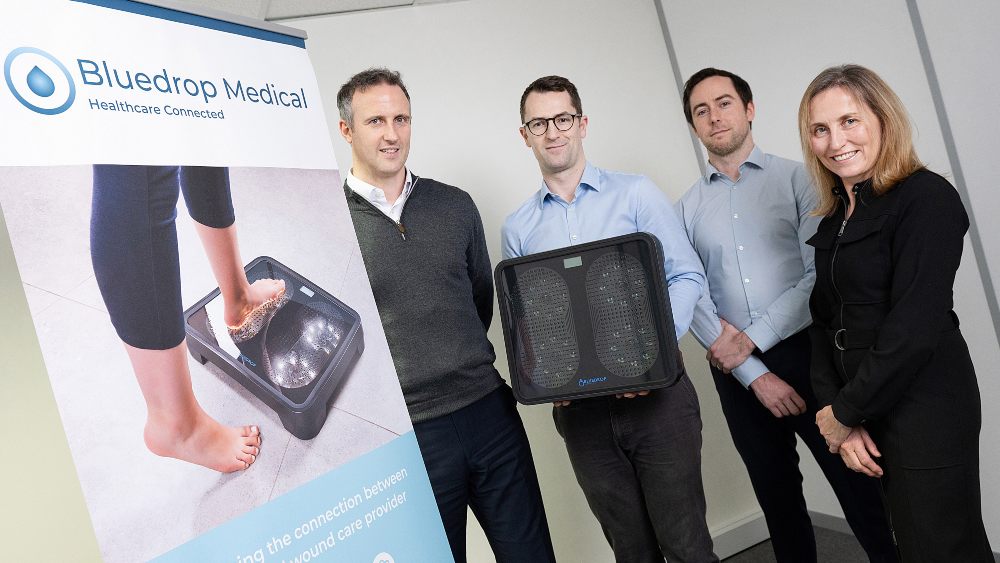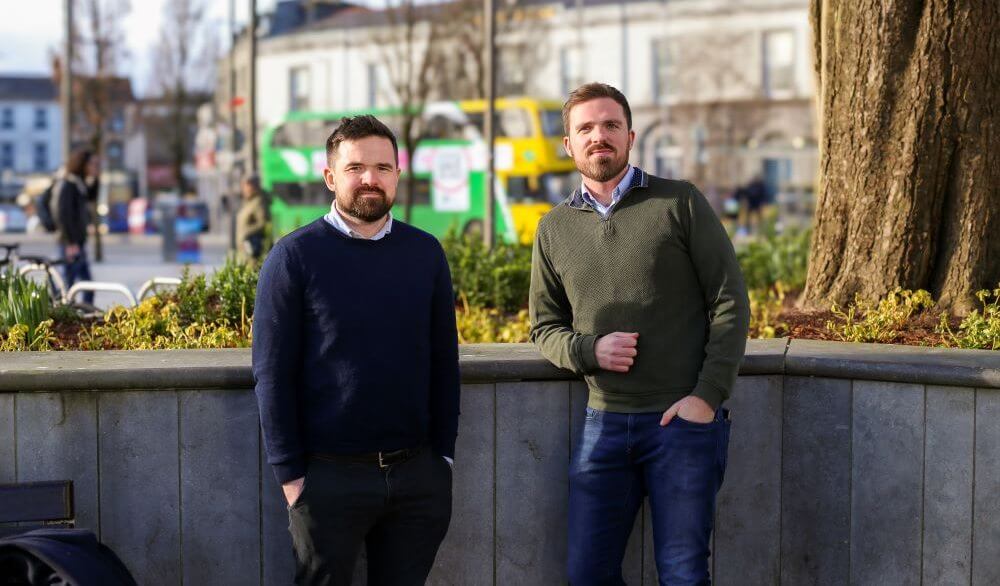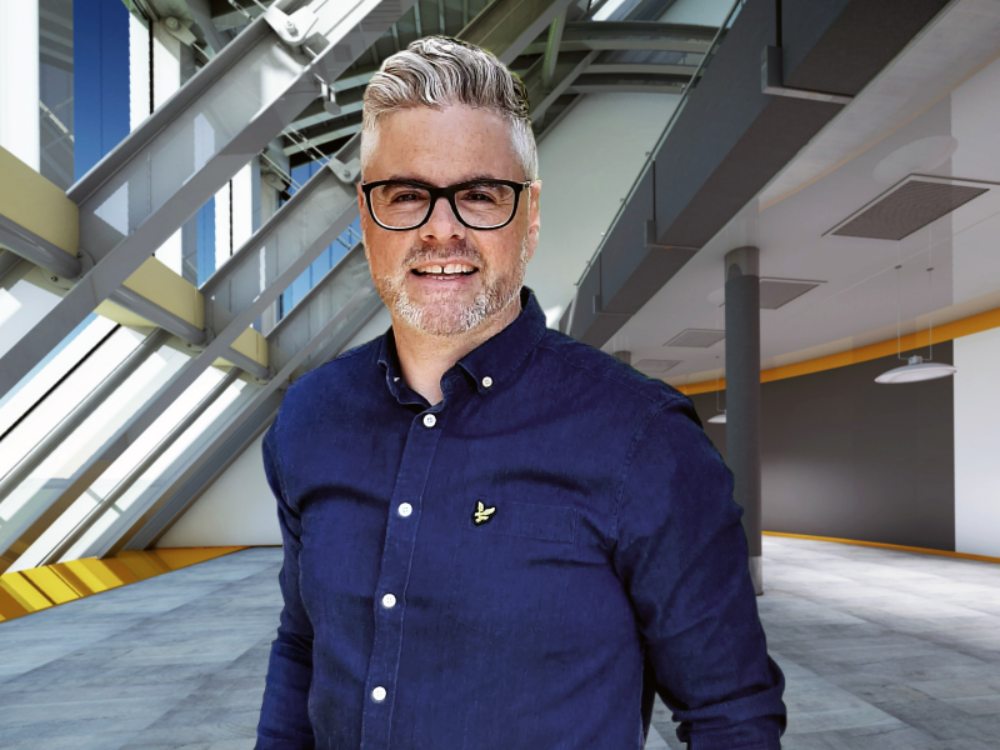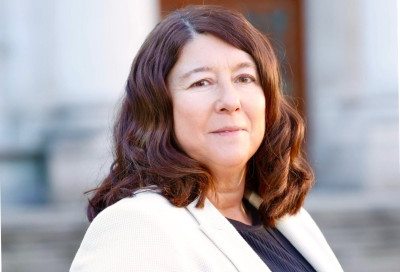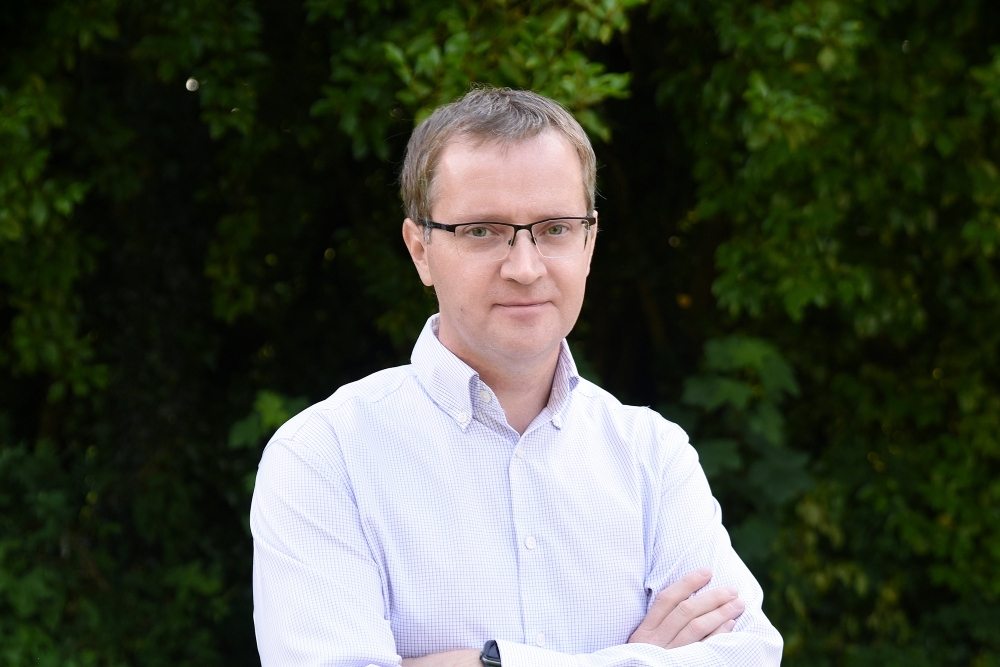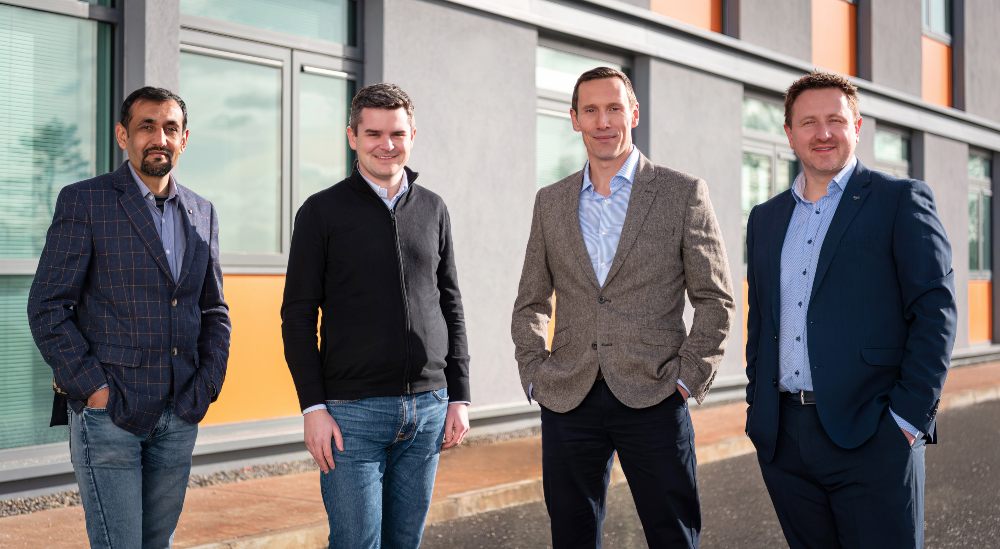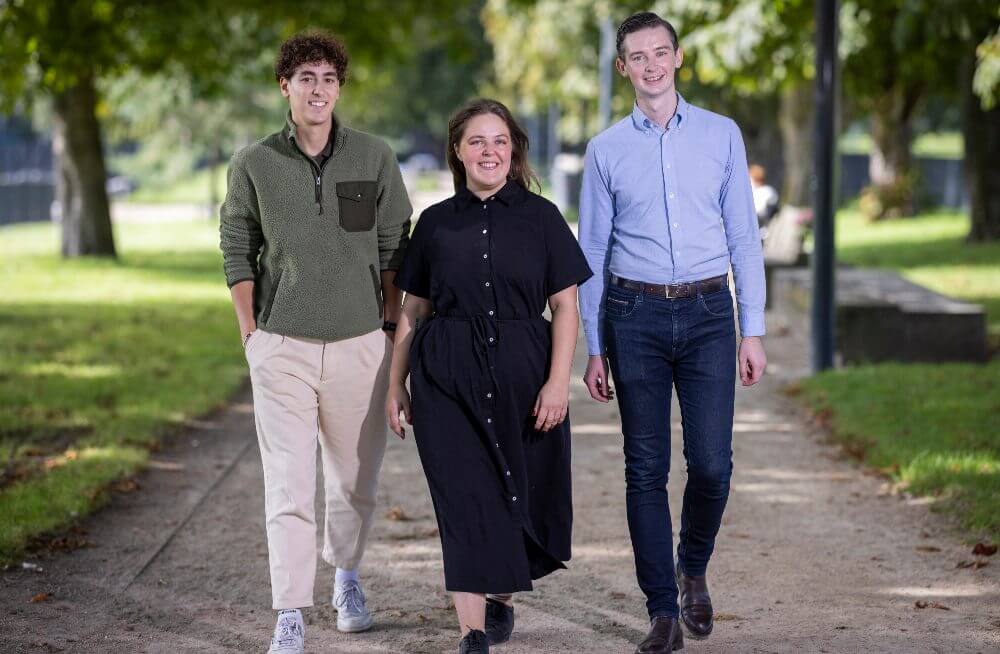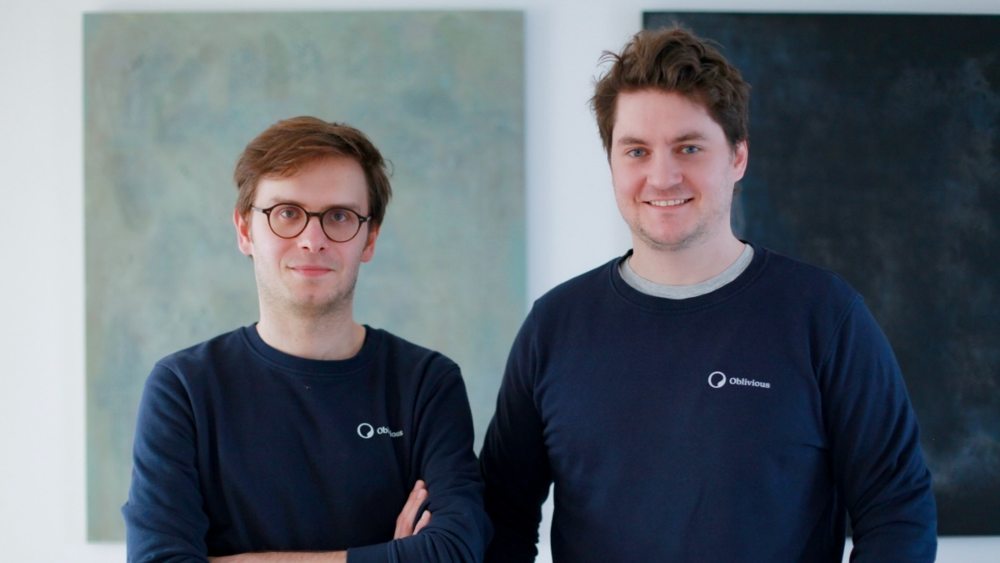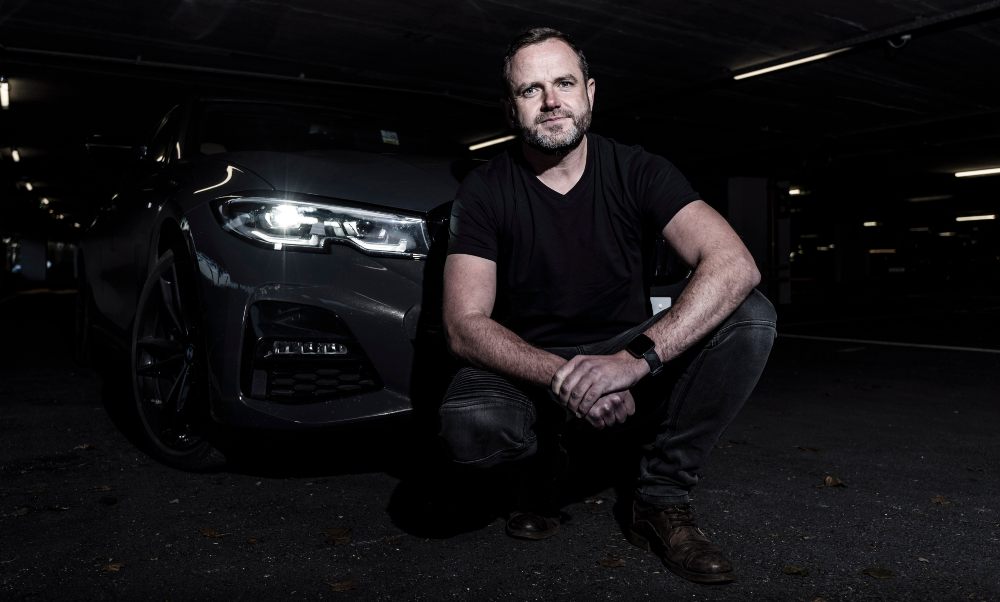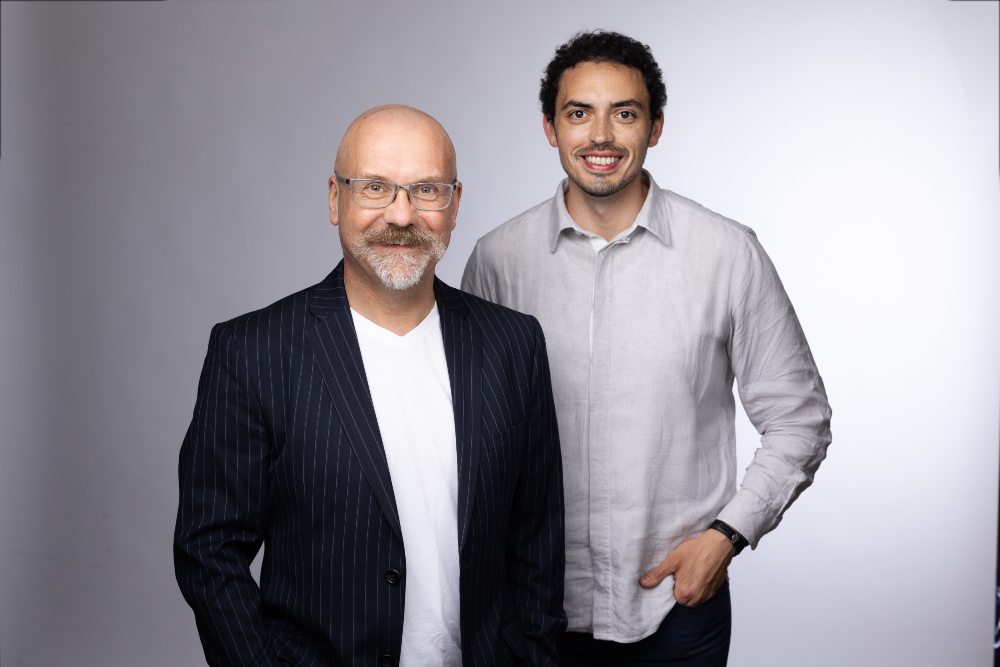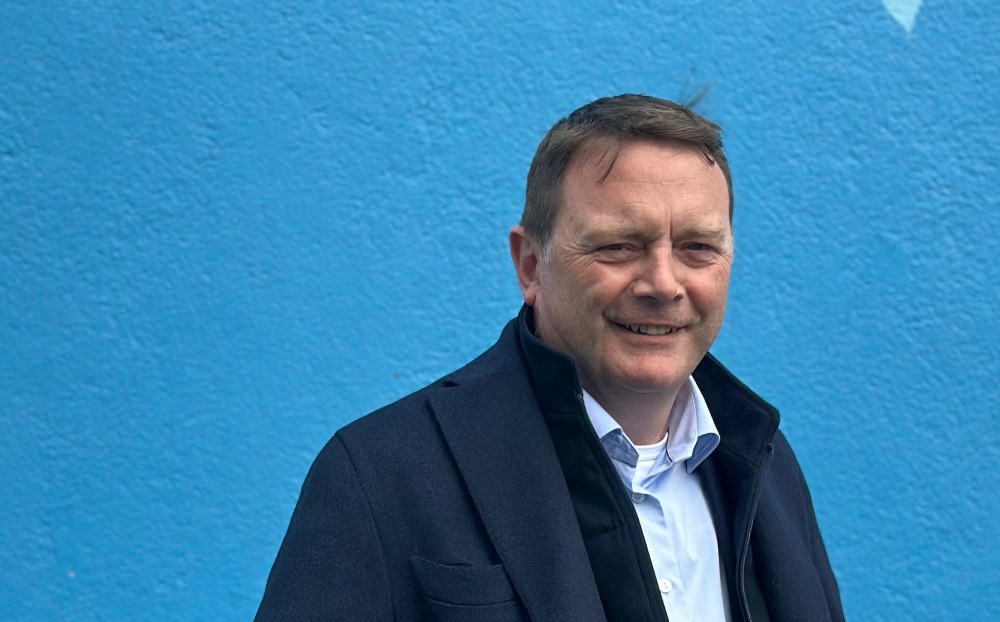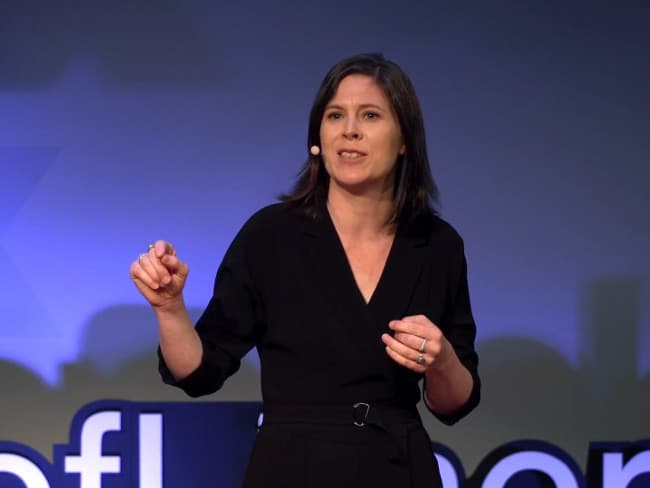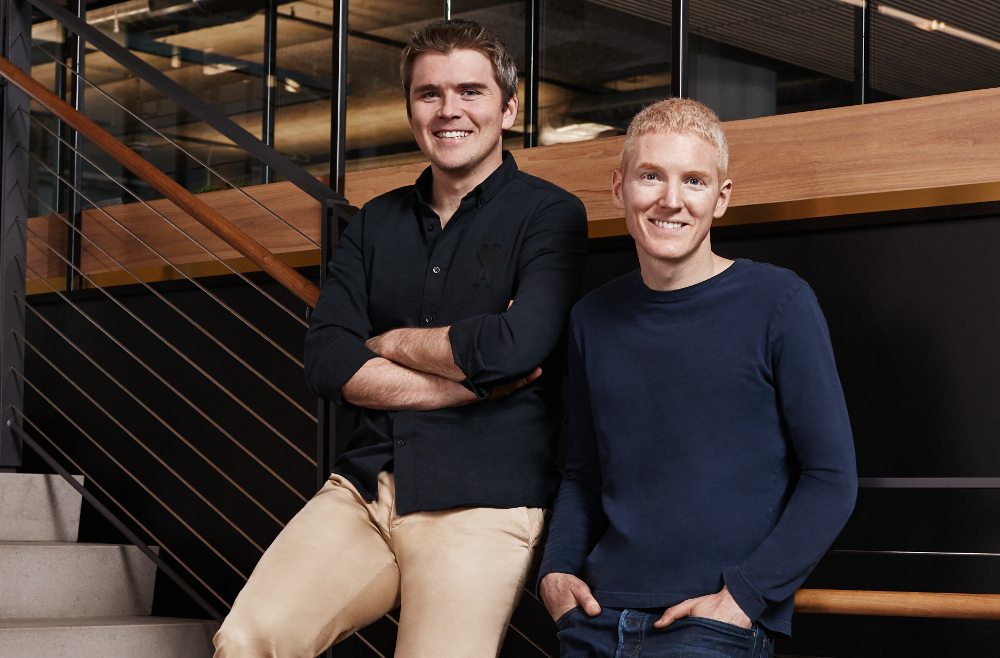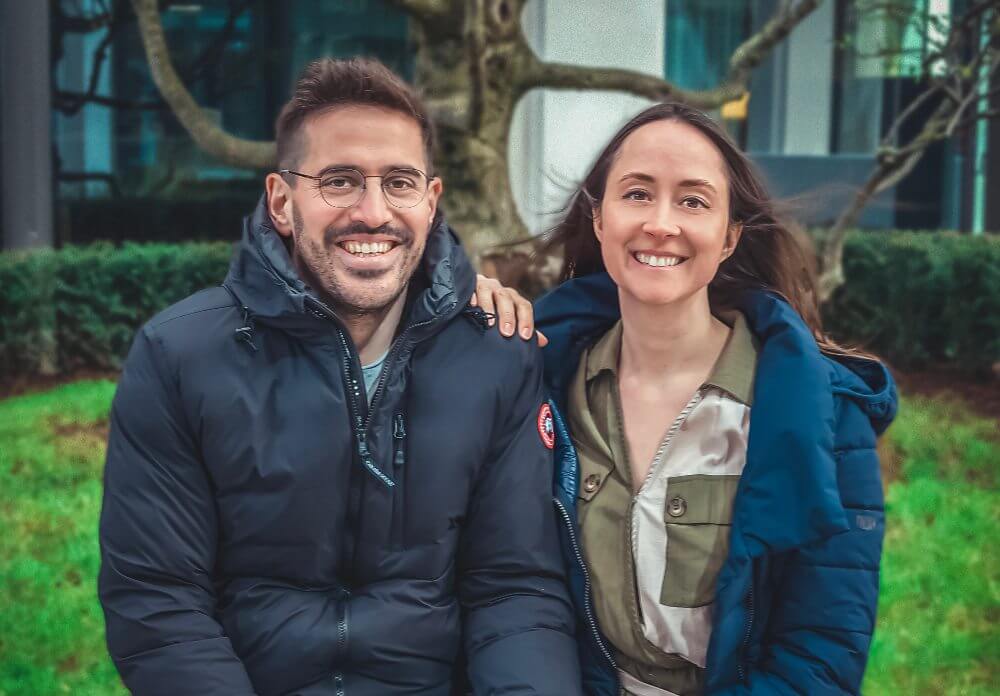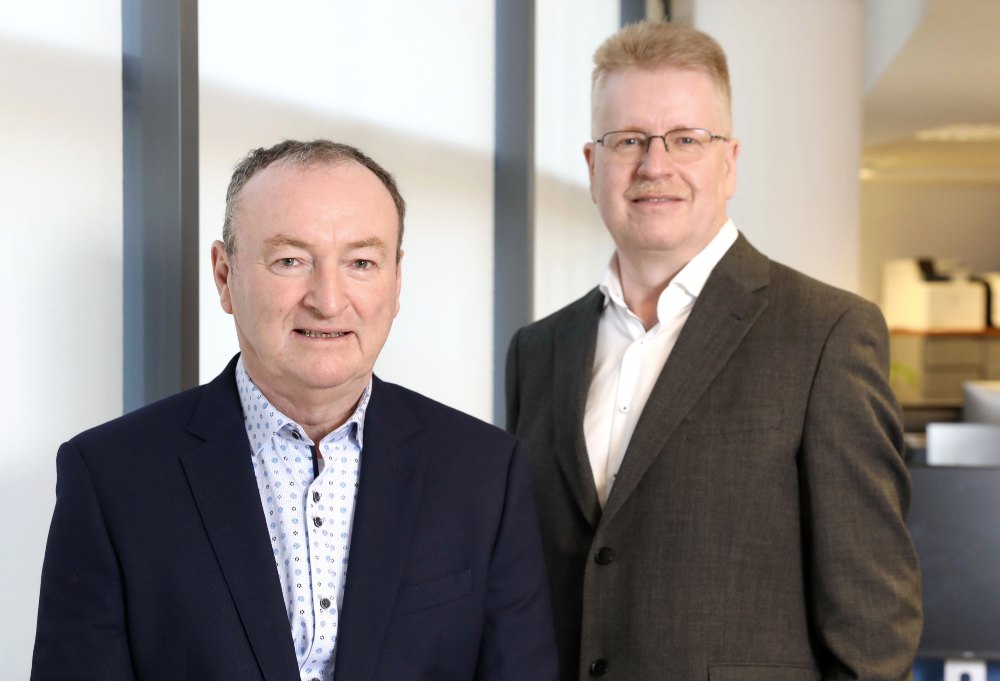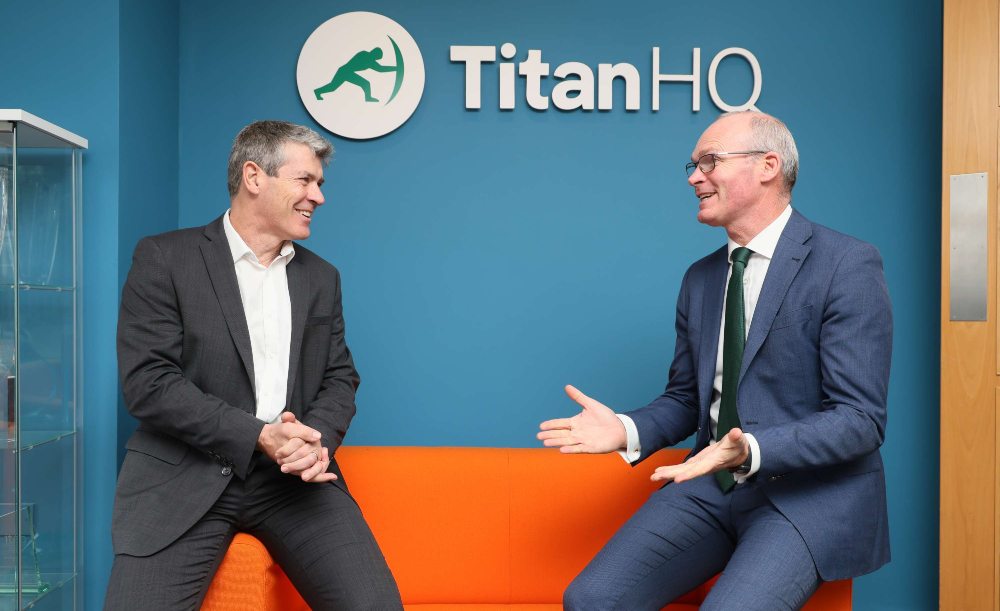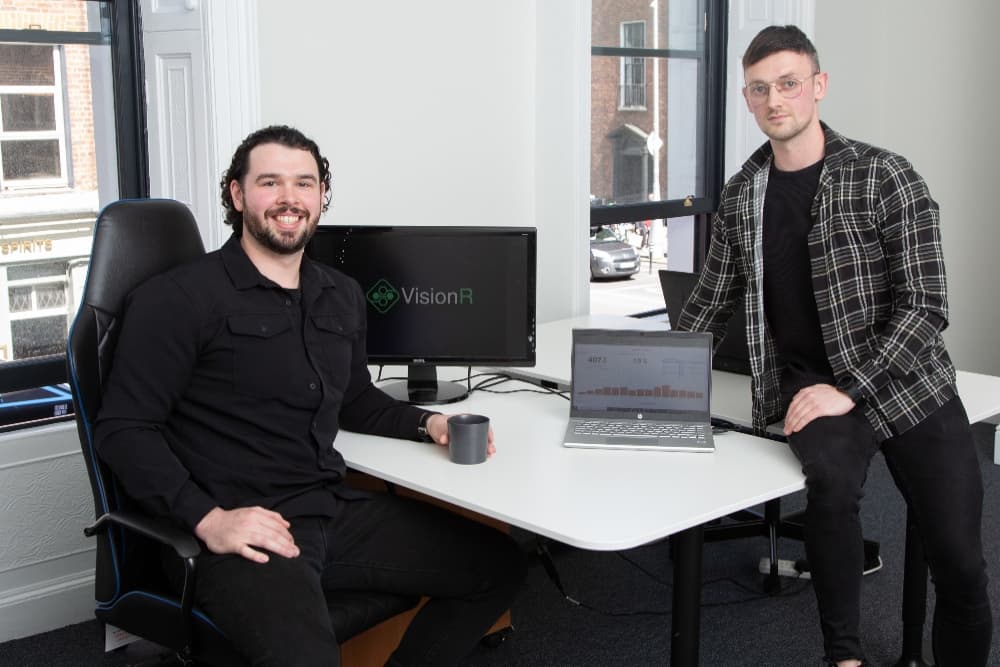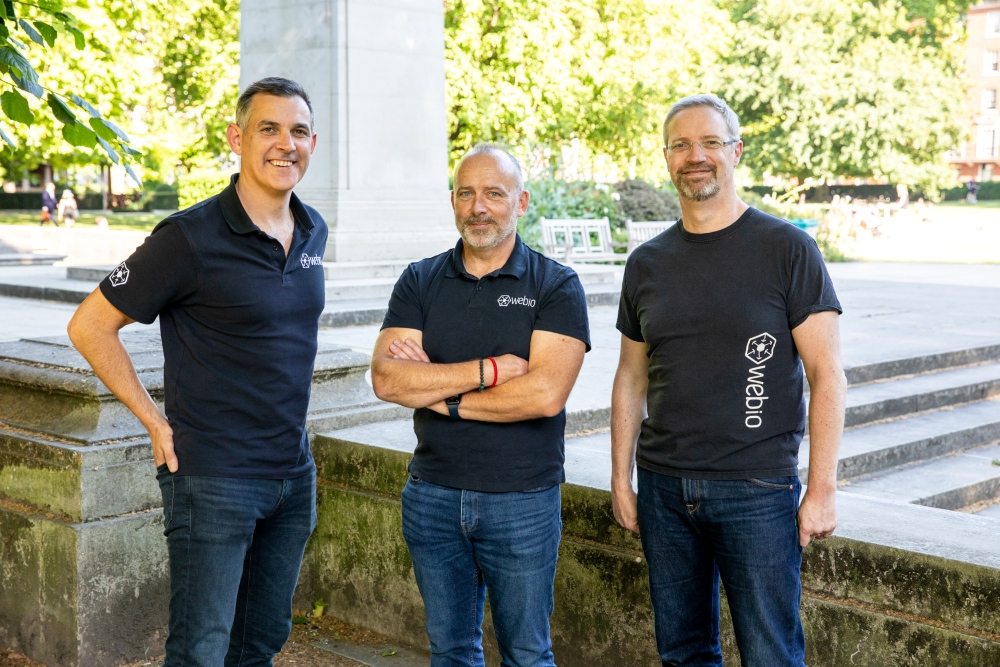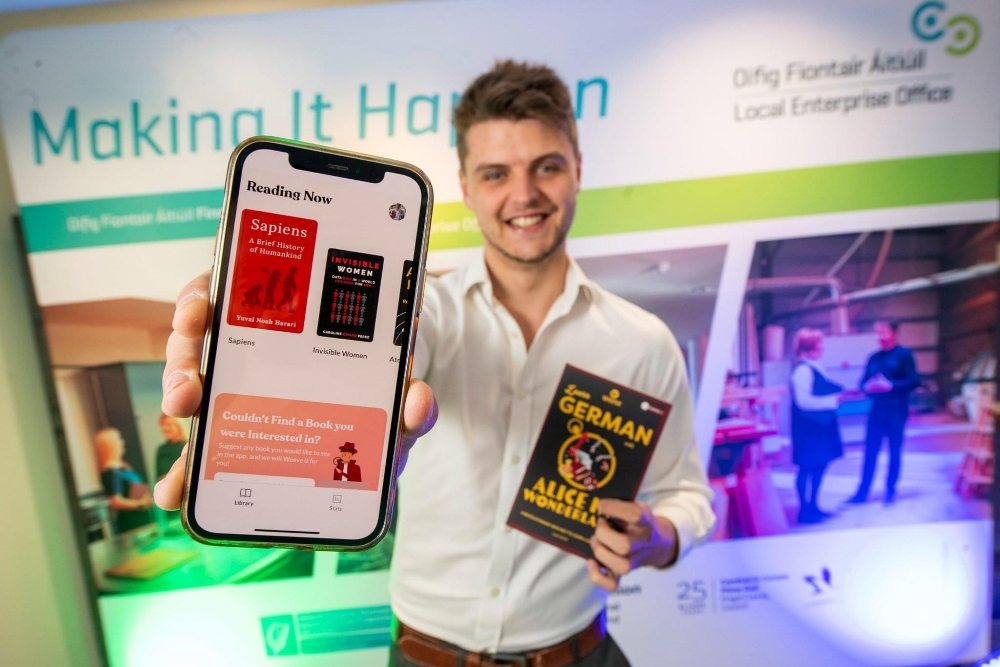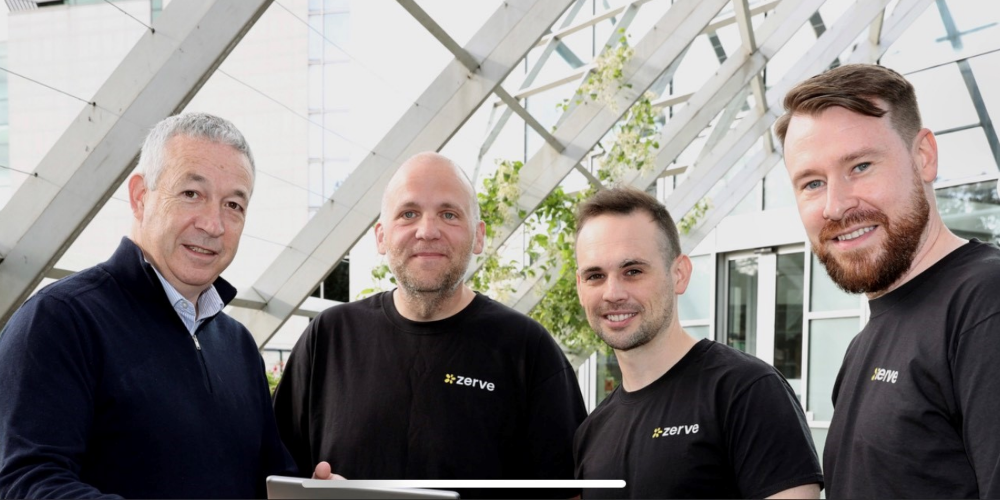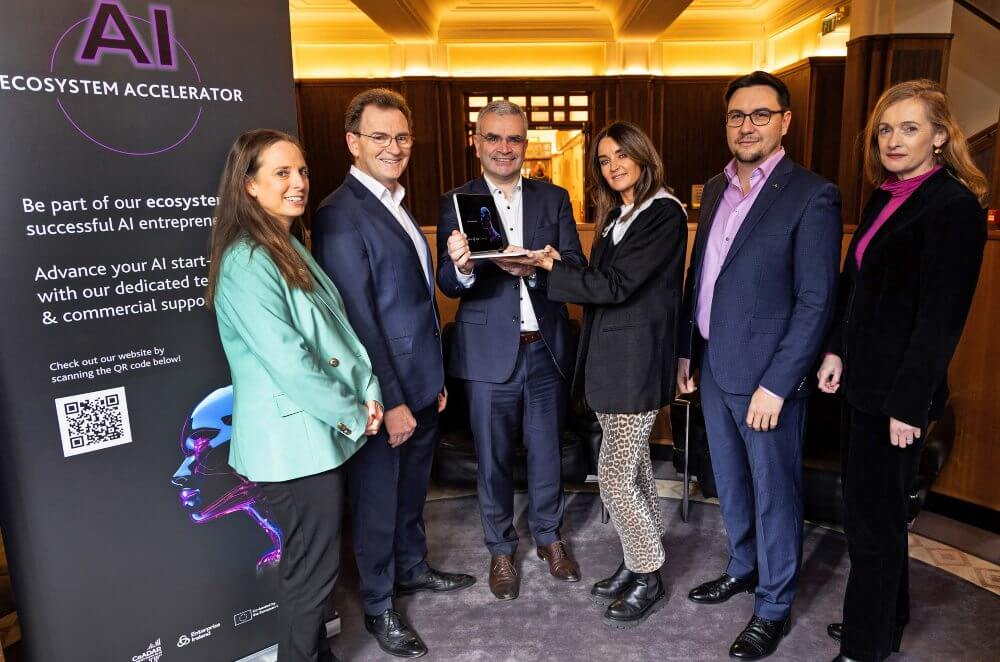Irish-based businesses are at the centre of the AI revolution. Here are the ones to watch.
The Generational AI (GenAI) revolution that is engulfing the world may not have been started in Ireland, but long before platforms like ChatGPT and Gemini became the current phenomenon, Irish businesses were already making astute use of technologies like machine learning and artificial intelligence (AI) to improve their product and services.
In turn these products and services are driving greater outcomes for businesses and organisations around the world.
Here are a few to watch:
Bluedrop Medical
Joe Bergin, Elkstone Head of Private Investment Office; Simon Kiersey and Chris Murphy, Bluedrop Medical cofounders; and Helen Ryan, Atlantic Bridge Operating Partner
Bluedrop has developed a device which diabetic patients use to scan their feet at home. This scan is then uploaded to the cloud and checked by AI to see if they are at risk of developing a diabetic foot ulcer, which if left unchecked can lead to amputation. Amputations caused by this have increased in Ireland by 45% in the last decade. Bluedrop Medical was founded by Chris Murphy and Simon Kiersey in 2015 to reduce the rate of preventable amputations for people afflicted with diabetes. Across the US and Europe, more than 250,000 amputations associated with diabetes occur each year, resulting in healthcare costs of over €30bn. In 2021, 645 of those amputations took place in Ireland, an increase of 45% over the previous decade. The business recently raised €10.5m in a funding round that will enable it to create 25 new jobs.
Brightflag
Brightflag was founded by Ian Nolan and Alex Kelly in2015 and has developed a platform that uses text analysis to read and understand legal invoices.
The Dublin 8 company’s customers include Uber, Telstra and Rimini Street.
“Our proprietary AI enables true cost control at every stage of legal work — from matter creation through invoice review,” Nolan said. “It creates entirely new data sets that legal departments can use to evaluate law firm performance, negotiate value-driven pricing agreements, and predict budget overruns well in advance.”
CeADAR
CeADAR is Ireland’s Centre for Applied AI, is headquartered at NexusUCD. Funded by Enterprise Ireland and the IDA, CeADAR has more than 90 member companies across a wide span of industries and is one of the Digital Innovation Hubs across the EU focused on delivering AI services to industry. The primary work of the Centre is on cutting-edge applied research and developing and deploying industry prototypes and solutions to companies. CeADAR is also very active in European research projects, spinouts, industry upskilling and has its own high-performance computing infrastructure.
Among examples of the work it is engaged in is a €200,000 project that proposes to use advanced tech including AI and drones to monitor Ireland’s deteriorating peatlands.
Another project conducted by Women in AI Ireland’s WaiPRACTICE programme in association with CeADAR is helping lawmakers to plan for the increasing numbers of Ukrainian refugees expected to arrive in Ireland and assess which areas will need additional resources to deal with the influx.
CitySwift
CitySwift founders Alan Farrelly and Brian O’Rourke
CitySwift specialises in helping local bus networks run more efficiently through the use of predictive analytics and big data. Founded by Brian O’Rourke and Alan Farrelly, CitySwift is a data analytics business on the move.
The business recently raised €7m in a funding round led by Gresham House Ventures. The round also included all existing investors following including Irelandia Investments, the Western Development Commission and ACT Venture Capital with the Ireland Strategic Investment Fund (ISIF).
This was followed by the opening of CitySwift’s first office in the UK and plans to create 50 new jobs.
Founded in 2016, CitySwift is a homegrown Galway headquartered company with a rapidly expanding team of 65 employees building an international roadmap.
A market leader working with all the leading UK operators and Public Sector Authorities, the business has consistently doubled recurring revenue over the last three years and is expanding globally into Europe, the United States, the Middle East, and South East Asia.
CozmoTec
Cuty Gupta’s Dublin tech firm Cozmotec makes tech accessible and profitable for businesses.
Gupta (pictured) has identified a gap in the market where SMEs are falling behind in terms of technology and are failing to make use of more efficient options.
The CosmoTec team is comprised of experienced project managers, software developers, innovation experts and business leaders driven by solving business problems with technology solutions.
Everseen
Founded in Cork in 2007, Everseen develops computer vision and artificial intelligence solutions for some of the world’s largest retailers. Led by CEO Alan O’Herlihy, Everseen employs 1,000 people globally.
The business develops AI-powered computer vision technology for the retail sector with inventory management and monitoring at self-service checkouts.
In recent months Everseen raised €65m in a Series A funding round.
Galvia
John Clancy, founder and CEO of Galvia
Formerly known as Chatspace, Galvia is a a decision intelligence platform that supports organisations to make better decisions through their data. The Galway business since 2017 has worked with some of the largest companies in the world including Nestlé and Atos as well as introducing an AI powered student engagement platform for NUI Galway. “Project Management is integral to enterprise,” Galvia CEO and founder John Clancy told ThinkBusiness.ie. “The vast majority of work is and will continue to be project-based. Studies show that half of all projects underperform and one third fail and it is estimated that failed IT projects cost enterprises €250bn a year across the US and Europe. Management is often limited to the subjective optimism or pessimism of project managers which can result in unnecessary and costly micromanagement.”
Getvisibility
Earlier this Getvisibility revealed plans to to expand its machine learning engineering and data science department to 30 people.
The Cork business has developed an AI-powered platform for data discovery, classification, security and governance.
The AI Academy is being developed to attract the right talent into the organisation, particularly for the machine learning engineering and data science department which is set to expand to up to 30 people during the said period.
Inclusio
Prior to founding Inclusio, Sandra Healy’s career spanned 20 years in the global telecoms industry and five years at Dublin City University where she was the founding director of the DCU Centre of Excellence for Diversity and Inclusion (D&I). Sandra is an Organisational Psychologist and NLP Master Practitioner and is considered one of the leading experts in D&I, having championed and driven D&I practice across industry for almost 20 years.
In 2015, faced with the challenges of every D&I practitioner of how to measure impact and return on investment on workplace culture and diversity, Sandra developed the concept of Inclusio. In 2016, she “spun in” the idea to DCU where the company incubated until 2020, when it was spun out of the university.
During her time at DCU, Sandra led a body of research with 35 global organisations across different sectors to better understand the problem and their needs – the result is the Inclusio solution that combines technology, psychology and AI and brings a scientific, evidence-based approach to measuring diversity and Inclusion.
Inclusio’s initial clientele comprised of several global corporations that had collaborated previously with Sandra. Today, Inclusio’s clients are an array of esteemed organisations from both the public and private sectors with significant growth in financial services, construction and engineering, and aviation. Some notable clients include FBD Insurance, and RSA Insurance 123.ie, Kilsaran, Linesight, Teagasc and PublicJobs.ie.
Headquartered in Dublin, Inclusio’s employees include organisational psychologists with diverse perspectives and the company’s 30+ team members are based across the globe from Brazil to India to the US to Poland.
Inscribe
Ronan and Conor Burke co-founded Inscribe in San Francisco along with Oisin Moran and James Eggers after graduating from university in 2017.
Inscribe is an automated document fraud detection system that allows businesses to instantly verify their customers when they request proof of income, proof of address, or proof of expense information.
In 2020 they were listed in Forbes 30 under 30 list.
Last year Inscribe raised $25m in Series B funding.
Intercom
Irish-led but born in San Francisco, Intercom is a customer communications platform that uses AI to help businesses provide personalised customer support. Intercom helps businesses deliver ongoing engagement to prospects and customers through personalised and in-context communication across channels, including in-product, messaging, email and more. Intercom’s technologies are used by more than 25,000 organisations worldwide, including Amazon, Atlassian and Lyft Business. More than 600m end users actively use Intercom every month, sending more than 500 million messages.
Keelvar
Alan Holland, Keelvar
UCC spin-out company Keelvar’s technology addresses inefficiencies in the global trillion-dollar procurement marketplace.
Its sourcing technology – which leverages AI, data science and smart sourcing bots that run on autopilot – empowers customers to make crucial supply chain decisions quickly and confidently amidst ongoing change and disruption.
“Procurement is broken. Costs are out of control, capacity is scarce and disruptions are everywhere. This dynamic makes it incredibly difficult for buyers and suppliers to remain agile, manage risk and strike deals,” said Alan Holland, founder and CEO of Keelvar.
“We see an immense opportunity to alleviate economic and supply chain bottlenecks by making the sourcing process easier, faster and more intelligent. Our technology fundamentally changes what’s possible by offering a new approach to intelligent automation and optimisation.”
Klearcom
Klearcom co-founder Satish Barot; Furthr VC partner, Colm O’Sullivan; and Klearcom co-founders Mark Rohan and Liam Dunne
Using Artificial intelligence (AI) and machine learning, Waterford business Klearcom tests Interactive Voice Response (IVR) systems used by businesses to manage incoming calls. Operating across four continents, the company’s global client base spans all industries and includes large multinational pharma, enterprise software, credit card and emergency services companies.
The business recently raised €1.5m in an investment round led by Furthr VC with Enterprise Ireland and HBAN’s Bloom Equity syndicate also contributing to the round.
Klearcom is currently on-track to grow to a team of 50 by year-end 2024, while revenues are expected to more than double this year. The investment will support the team growth and the company plans to add to its technical, marketing and sales teams. Its technical team will be based in Waterford, while marketing and sales hires will be split between Waterford and the US.
LearningPool
AI technology revealed by Learning Pool helps companies identify and respond to skills gaps as they emerge in their organisations.
The Derry business is leveraging the know-how of People-Analyltix, a Swiss AI pioneer it recently acquired.
Learning Pool said its new technology reflects a profound change in learning technologies and a fundamental shift in how organisations think about talent and development.
“Every global enterprise is struggling to attract and retain skilled employees, and the widening skills gaps that are stopping businesses from growing at the pace they desire are apparent in every boardroom conversation,” said Ben Betts, CEO of Learning Pool.
“Learning Pool’s acquisition of People-Analytix, and the subsequent advancements it will bring to our platform, means that we can now give customers the power to automatically address skills gaps as they appear. It is a tremendously exciting technology and a fundamental component in our wider mission to support talent development in creating extraordinary performers.”
Micron Agritech
TU Dublin spinout Micron Agritech player is revolutionising rapid animal health testing using AI.
With a cumulative funding of €5m to date, the spin-out is dedicated to revolutionising rapid animal health testing through the innovative use of artificial intelligence technology in its Micron Kit.
Founded by Daniel Izquierdo, Tara McElligott and Sean Smith in 2019, the Micron Kit allows veterinarians to conduct on-site, rapid parasite testing on animals using their mobile phones, delivering results in minutes.
“Our goal is to make our platform accessible to vets across the globe, starting with penetration across the Irish and UK markets, which will combat the build-up of medication resistance, while giving farmers and vets tools to monitor animal health, improve the lives of their animals while increasing productivity,” Izquierdo said.
Oblivious AI
Oblivious founders Robert Pisarczyk and Jack Fitzsimons
Oblivious AI has developed pioneering privacy enhancing technologies to help organisations keep sensitive data safe while creating insight opportunities for the data owners. Oblivious AI recently secured $1.05m in an initial seed funding round from investors that include Atlantic Bridge, Act Venture Capital, Hustle Fund and a group of angel investors. The NovaUCD-headquartered company, which was co-founded in 2020 by Robert Pisarczyk (pictured) and Jack Fitzsimons, will use the funding to build out its core team, further develop its initial product offering, and continue to work closely with its early customer base.
Outmin
Outmin provides outsourced accounting and bookkeeping services for small but scaling companies, leveraging AI and cloud technology to create a best in class experience. The business recently raised €1.5m in seed funding to tackle the distraction of admin, with an initial focus on accounts and bookkeeping. Outmin co-founder, Ross Hunt, said: “90pc of the world’s businesses are SMEs, but for a variety of reasons, SME professional services today do not reflect the modern world. We believe that tightly integrating accountants and book-keepers within a cutting-edge data science and machine learning platform is the first step to enable a revolution in SME professional services and our explosive growth to date has already validated our innovative approach.”
Protex AI
Protex AI develops an AI-powered proactive health and safety technology that enables an injury-free industrial workplace.
The business was founded in Limerick in 2021 by CEO Dan Hobbs and chief technology officer Ciaran O’Mara.
Protex AI uses computer vision to identify health and safety issues and reduce injuries.
The business last year raised $18m in a Series A round led by Notion Capital with participation from Playfair Capital, Elkstone and Firstminute Capital.
“The strategic investment from both Flexport and SCOR Ventures is a clear indicator that there’s a need for technology-based solutions to radically improve safety standards in the industry,” Hobbs said at the time.
“Protex AI has a compelling proposition to address this need. With the cost of workplace accidents estimated at $171bn in the US alone due to losses in productivity, insurance, and medical expenses; safety technology is a growing space as companies look to prevent huge losses in costs and time.”
Provizio
Provizio CEO Barry Lunn
Provizio is a Limerick tech business founded by entrepreneur Barry Lunn with the ambition to make its autonomous accident-prevention technology in cars as ubiquitous as seat belts
Lunn, who sold his previous business Arralis an aircraft radar technology firm, for a reported $50m in 2017, set about assembling a dream team of experts in robotics, artificial intelligence (AI) and vision-and-radar sensor development.
The product is a five-dimensional sensory vision system that will augment drivers’ capabilities and prevent accidents in real-time and beyond line of sight.
Provizio has raised $6.2m in funding from a range of investors including Movidius founders Seán Mitchell and David Moloney, automotive entrepreneur Bobby Hambrick as well as the European Innovation Council and Act Venture Capital.
An estimated 1.35m people are killed every year in road traffic accidents with more than 20m injured, according to the World Health Organisation, costing more than $2trn in the US alone.
94% of these crashes are caused by human error. Lunn wants to fix this by creating a device that can be installed in most cars for a unit cost of less than $100.
“Augmenting the human driver without being intrusive is the next generation of safety,” Lunn told ThinkBusiness recently.
ShopBox AI
Shopbox AI is focused on bringing high end Artificial Intelligence to any size of online retailer in order to generate more revenue from online shoppers and compete in a highly competitive space. This is done through an easy to integrate AI product hyper-personalisation platform, already proven to work in over 50 online retailers. The basic issue online retail faces is extremely low margins driven by the ever increasing cost of ads. By “wrapping” the store around the customer, Shopbox clients typically see a 3x increase in conversion. The business was founded in 2020 by Alan Gormley (CEO) and Tariq Zaki (CTO).
Siren
Scaling Galway tech business Siren, which specialises in cyber intelligence and works with law enforcement agencies all over the world, last year raised €12m in backing from the European Investment Back to fight cybercrime.
Its technology allows investigators to make complex searches, organise the results visually and create advanced reports to share findings with their teams. The platform is also used by large corporations to protect their assets and networks against fraud and cyber threats.
The Galway firm has partnered with US based non-profit organisations like the Anti-Human Trafficking Intelligence Initiative (ATII) and the National Child Protection Task Force (NCPTF) who use its patented technology to solve complex intelligence problems, identify traffickers and reduce human trafficking.
Siren was founded in Galway in 2014 by Giovanni Tummarello and Renaud Delbru as a spinout from Data Intensive Infrastructure, a Big Data research group at NUI Galway.
CEO John Randles (pictured above) joined the company as CEO in 2017 after having played a leading role in the success of a number of other well-known indigenous Irish success stories, including banking software player Eontec which was acquired by Siebel and market data player Polarlake which was acquired by Bloomberg.
Skellig AI
Leitrim business Skellig AI holds the keys to Ireland’s industrial and manufacturing future by bringing experienced engineers up to speed with the latest AI and machine learning skills.
Led by founder Iain Keaney, Skellig.ai’s programs are taught with a Top-Down approach, which means participants get a chance to build their own AI models from the very beginning. This gives the participants a more practical experience and improves memory retention.
Soapbox Labs
Dublin-born SoapBox is on a mission to transform how kids learn through interacting with technology through their voices.
The business has developed a speech recognition platform that uses artificial intelligence (AI) to help children aged four to 12 advance their reading skills in such a way that it could address childhood literacy all over the world.
Driving the company’s innovation vision and strategy, its founder Dr Patricia Scanlon was named one of the world’s top women in tech by Forbes.
The business was acquired in November 2023 by US education tech business Curriculum Associates for an undisclosed sum.
Stripe
Stripe was founded in San Francisco 2009 when CEO Patrick Collison was just 22 and his brother John was 19. Prior that the brothers who hail from Nenagh but as teenagers living in Limerick established a start-up in 2007 called Shuppa that later became known as Auctomatic. They sold Auctomatic for $5m when they were just 19 and 17 respectively.
Of the 42 countries in which Stripe powers businesses today, 31 are in Europe. And many of the continent’s largest and fastest growing companies are building on the platform.
Over the recent crucial Black Friday sales weekend Irish-led business Stripe processed 300m transactions, with a peak volume of 93,304 per minute.
In what was the largest-ever four-day period on the Irish-led payments platform Stripe some $18.6bn payments were processes as shoppers all over the world snapped up bargains.
Stripe employs around 1,000 engineers in Dublin to build out its platform.
The business first began supporting Irish businesses in 2013 when only a few hundred Irish businesses used Stripe.
Stripe uses AI to provide a better experience in some of its services, including virtual assistants and chatbots.
Talent Shake
Talent Shake is led by husband and wife team Lia Boyland and Remy Bricaud, both seasoned entrepreneurs
They believe that by adopting simple AI agents today, businesses have the opportunity to learn and grow alongside them.
Boyland says that these AI agents are designed to shift roles, not replace them. Instead staff can focus on strategic tasks that require human expertise.
Tekenable
Established in 2002 by Nick Connors and Peter Rose, Irish tech business Tekenable has grown to employ more than 210 people and is scaling fast.
Tekenable’s progress over the past few years has been characterised by astute investments in the spaces of AI, cloud and ESG.
The company recently completed the acquisition of Salesforce cloud specialist business Tether for an undisclosed sum.
Combined the businesses will have 400 customers, projected revenues close to €21.5m with operations across Ireland, UK, Spain, Hungary, Nordics and UAE.
TitanHQ
Cloud-based email and web protection company TitanHQ has seen recruitment surge almost 45pc since last year. The expansion comes as TitanHQ has welcomed an influx of new business as more managed service providers and SMBs seek better and more powerful email and web security solutions. Headquartered in Salthill, Galway, and with offices in Tampa, Florida, TitanHQ are a 25-year young multi-award-winning cloud security vendor. The company is trusted by over 12,000 businesses including 2,500 MSPs across 150 countries, protecting companies including T-Mobile, Virgin, O2, ViaSat, Pepsi, and Datto. In addition to its organic year-on-year growth, recent significant investment from Livingbridge investor group has turbocharged the company’s growth. This has allowed TitanHQ to accelerate ambitious growth plans through increased investment in product development and in people.
VisionR
Oran Mulvey and Shane O’Sullivan
VisionR uses AI to provide bricks and mortar retailers with the same level of data analytics that e-commerce firms employ.
The Irish company’s technology is now tracking more than 300m consumers globally every year.
VisionR, which recently raised a further €900,000 from existing investors, was founded by Oran Mulvey and Shane O’Sullivan.
The company combines software-as-a-service (SaaS) with a physical sensor it calls the VisionrR Scout that transforms physical shopping into online, actionable data.
Co-founder Oran Mulvey recently told ThinkBusiness that he estimates the retail analytics market is currently worth $3.5bn globally and is expected to triple over the next eight years.
“Retailers are investing more in finding out how shoppers behave in-store and interact with their products. The shopping experience is going to be a focus in getting customers to shop offline”
Webio
Dublin and Limerick-based Webio provides conversational middleware for very large companies in retail, financial services, and utilities. Founded by Paul Sweeney, Graham Brierton, Mark Oppermann and Cormac O’Neill Webio recently raised €2.5m. Webio operates in the conversational AI market which is expected to grow to €11bn by 2024. While its customers have been predominantly in the Irish and UK markets, Webio has recently secured several key partnerships in Europe and the US, laying the foundations for future growth. Previously, Webio secured $4m to scale its conversational AI technology for use in the collections and payments industry worldwide.
Weeve
Irish start-up Weeve helps people to learn new languages by weaving them into popular books. Founded by Cian McNally, Evan McGloughlin, Oisín Morrin and Aaron Connolly, Weeve aims to make learning new languages fun. ““Our Weeve application acts as a reader or audio player for weeves. Weeves are condensed 15-30 minutes summaries of the best-selling non-fiction titles,” McGloughlin explained. “Our AI technology matches users to the perfect series of books based on their own individualised learning goals. From economics and startups to sex and relationships and everything in between, all while seamlessly acquiring a language of their choice.”
Zerve
Irish start-up Zerve’s platform allows teams to collaborate and share their outputs more easily. Zerve’s cloud-based, serverless technology utilises a novel, stateful architecture to create a scalable, collaborative development environment.
Zerve was co-founded in 2021, by college friends Phily Hayes (ex-LearnUpon and Deloitte) and Jason Hillary, PhD, Engineering, and later joined by Greg Michaelson, former Chief Customer Officer of DataRobot.
The company is currently one of 10 start-ups chosen from Europe to participate in Intel’s Ignite Accelerator program for deep-tech companies. Since 2019, the 148 companies that have gone through the programme have raised over €1.6bn.
Zerve recently raised $3.8m in pre-seed funding.
-
Bank of Ireland is welcoming new customers every day – funding investments, working capital and expansions across multiple sectors. To learn more, click here

